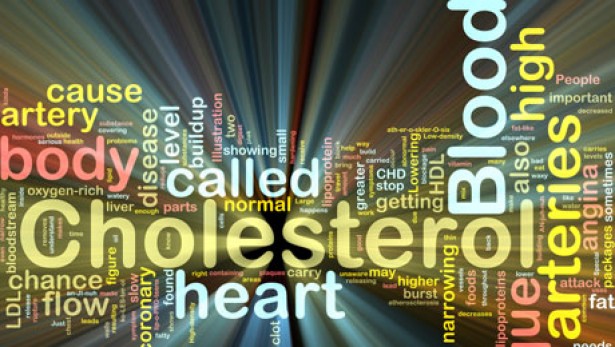
No doubt you’ve heard about ‘good’ and ‘bad’ cholesterol, but what exactly is good and bad cholesterol, why do we need it and how can we increase our level of good cholesterol?
What is Cholesterol?
Cholesterol is a fat-like substance which is mainly produced in the body by the liver, however up to 40% can be obtained through diet. It comes in two forms: LDL or low density lipoprotein (bad) and HDL or high density lipoprotein (good).
So when the doctor checks your cholesterol levels, the results may show three different readings: LDL, HDL and Total. Total cholesterol is simply the amount of LDL and HDL combined.
If only total cholesterol is measured, this can be misleading because you may be told your cholesterol is high, but it might be the good cholesterol that is high. So be sure to ask your doctor to check your levels of LDL and HDL to give an accurate picture.
Why is Cholesterol Good for Us?
With two different types of cholesterol, you may have guessed that they have different roles in the body, which they absolutely do! LDL cholesterol, for example, dumps cholesterol in the arteries, which then sticks to the artery walls, and can lead to cardiovascular diseases such as atherosclerosis, heart attack, strokes, angina and coronary heart disease.
HDL cholesterol, on the other hand, picks up excess LDL cholesterol and carries it to the liver to be removed from the body, thus preventing a build up of bad cholesterol and lowering your risk of cardiovascular disease.
In addition, cholesterol is required by the body to make hormones such as sex hormones and hormones that increase energy levels. It is also involved in the production of vitamin D, and therefore supports your immune system.
Cholesterol is also a component of bile acids which helps the body digest fatty foods. Cholesterol also provides a protective insulation around nerves throughout the body, including the brain.
Last but by no means least, cholesterol maintains the integrity of cell membranes, and as every function in the human body is reliant on a well-functioning cellular membrane, you can see why cholesterol is essential to human life.
How to increase good cholesterol by eating
Now that you know what cholesterol is and why it is important, let’s look at foods that you should avoid and foods that will help you raise your levels of good cholesterol.
Bad cholesterol (LDL)
Bad cholesterol (LDL) is present in saturated fat, which is found in animal products, particularly red meat, lamb, beef, bacon and sausages, as well as dairy products, which is why vegetarian and vegan diets are naturally lower in bad cholesterol.
Good cholesterol (HDL)
There are number of tasty and versatile foods that can raise your good cholesterol (HDL) level. The most important foods you can eat to raise your HDL level are those that contain essential fatty acids. These include:
- Salmon
- Mackerel
- Walnuts
- Pine nuts
- Flax seeds
- Avocados
- Olive Oil
Aside from those containing essential fatty acids, there are other foods that can help raise your levels of good cholesterol, including:
- Turkey
- Tuna
- Chicken
- Mushrooms
- Carrots
- Peppers
- Strawberries
A function of good cholesterol is to remove excess bad cholesterol from the body – which is carried out via your digestive system.
Improving your digestion, by eating high-fibre foods such as fruits, vegetables and whole grains (like oats, brown rice and brown bread) will help carry the excess cholesterol out of your body and in therefore help lower your LDL level.
Remember to drink plenty of water when you increase fibre in your diet.
Butter or Margarine?
Speak to different people and each will have a different opinion on whether butter or margarine is better for you.
The controversy surrounding margarine is that it is high in trans fatty acids, which are formed during the manufacturing process and can damage the body’s cells. However this practice has largely ceased and most margarines are now fortified with beneficial omega oils (those essential fatty acids I mentioned earlier) which help raise your good cholesterol.
Butter, on the other hand, is high in saturated fat, which, as we have seen, increases bad cholesterol. It is, however, a more natural product.
But when looking at their effects on cholesterol, margarine looks to be the healthier option.
In fact, a study in 2000 and published in The Journal of the American Medical Association showed that margarine lowered LDL cholesterol levels.
Other factors affecting your cholesterol
A recent study concluded that LDL cholesterol can be reduced by an increase in exercise, while another study showed that combining aerobic and resistance exercise, HDL cholesterol can actually be increased.
Smoking is never good for your health, and its affect on cholesterol is no different. Smoking makes it harder for good cholesterol to remove bad cholesterol from the arteries, and so it would be recommended to stop smoking in order to help prevent clogged arteries.
As you can see, cholesterol is essential to the body and there are many ways to increase your levels of good cholesterol and reduce your levels of bad cholesterol.
However, even though diet and lifestyle play a huge role on cholesterol levels, high cholesterol can also be influenced by your genetic makeup.
So, if you are worried about your cholesterol levels, it is always recommended that you consult your doctor.
